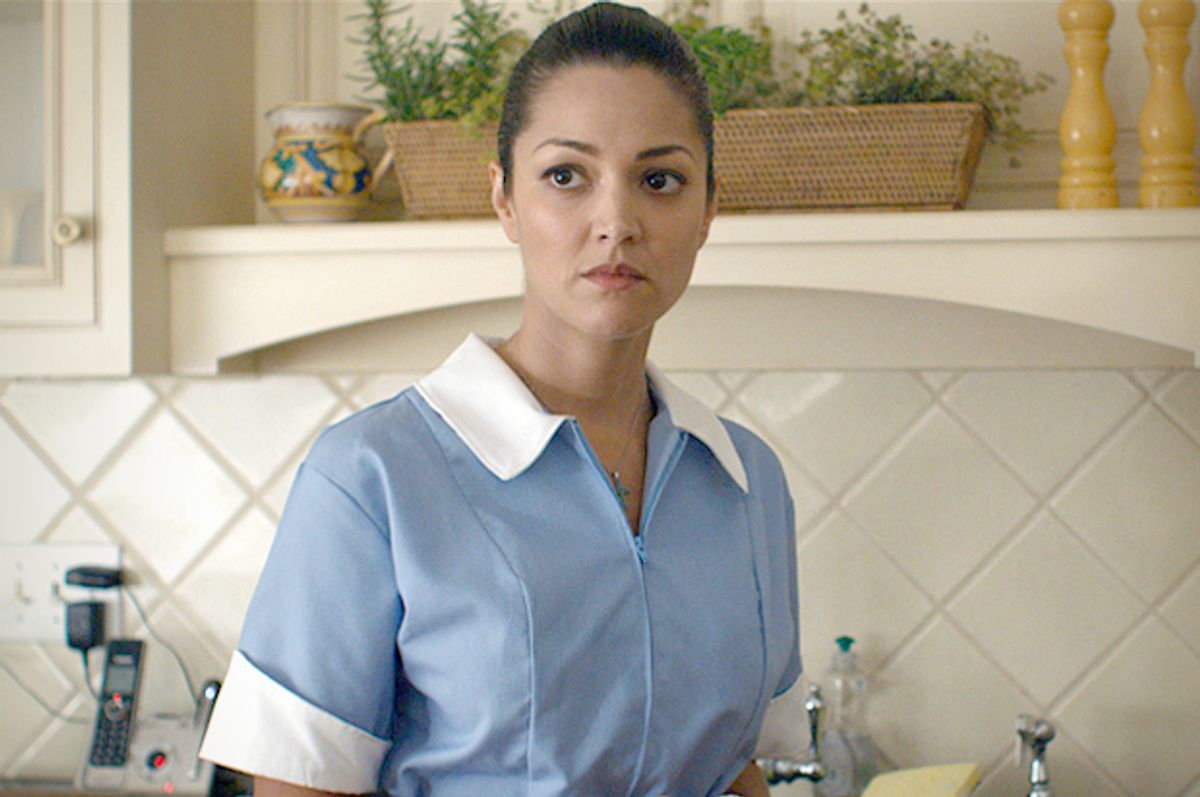It couldn’t be clearer that writer-director Michael Walker means the low-budget psychological thriller “The Maid’s Room” as a commentary on inequality, and the nature of the power relations it produces. There’s only one sin of which you can accuse Drina (Paula Garcés), the Colombian immigrant who accepts a fateful gig as live-in maid to a wealthy New York family at their summer home in the Hamptons, the legendary resort area on the East End of Long Island. She’s overly idealistic and way too innocent, at least when it comes to believing America’s rhetoric about itself. Everyone is equal in the eyes of God and before the law, she tells Mr. Crawford (Bill Camp), her patrician employer. “In the eyes of God maybe, but not to me,” he says. (He’s paraphrasing George Washington, although he may not know it.)
Let’s be clear right up front that “The Maid’s Room” doesn’t quite work, intriguing premise and all, and that the fault lies with Walker’s labored script and wooden characterization. He has a highly professional cast headlined by Garcés, a TV veteran who’s had recurring roles on “The Shield,” “All My Children” and “Devious Maids,” and also featuring veteran character actor Camp and Annabella Sciorra (of “The Sopranos” and “Law and Order: Criminal Intent”). He actually shot the film on Long Island rather than in Canada (which is unusual at this budget level) and absolutely gets an A for ambition. But if “The Maid’s Room” is worth watching as a dog-days alternative to blockbuster fare, that’s pretty much because of its essayistic or allegorical potential, rather than the actual movie you’ll see on the screen.
Like another new indie genre film, Nicholas McCarthy’s horror film “At the Devil’s Door” (which I plan to cover later this week), “The Maid’s Room” combines familiar elements of thriller formula with contemporary social and political anxieties. This is nothing new, of course. Going back to the monster movies of the Cold War and the crime films of the 1930s, it’s often at the cheaper and more disreputable end of American cinema that you can find filmmakers trying to burrow directly into the collective unconscious. If “At the Devil’s Door” is a far more ludicrous film, employing the economic downturn and the foreclosure crisis as both a literal doorway for Satan and a metaphorical example of his power, it also has a confidence and an atmospheric breadth that “The Maid’s Room” can't match. Walker’s film, however, requires no supernatural intervention to depict the power of evil.
Drina has come to America with dreams of getting a college education and a middle-class existence, but in those and other ways she seems to have teleported in not just from Bogotá, but also from about 1995. She apparently hasn’t heard about cellphones and MP3 players and doesn’t know how to drive; in other words, she’s Gothic Thriller Girl, trapped in an isolated house with people who do not necessarily mean well. And then there’s the “Erin Brockovich” poster she puts up in her bedroom, which is supposed to be a key to her character but seems like a wildly improbable cultural reference. In any event, when Drina figures out that the Crawfords’ wastrel teenage son, Brandon (Philip Ettinger), has been involved in a fatal hit-and-run accident – and that his parents are determined to cover it up -- she conceives the misbegotten notion that she should be honest and forthright about it.
In a certain sense, my exasperated reaction to Drina, and to “The Maid’s Room” as a whole, may make Walker’s point: We pay lip service to the idea of equality and justice for all, while understanding that it’s all a bunch of crap. I get that Drina is supposed to be a newcomer to America, unfamiliar with our folkways, but it’s not like Colombia is an idyllic land devoid of inequality or power politics. She has various realistic options, which begin with getting the hell out of that house and end with taking the thick envelope of cash Mr. Crawford is offering her and then getting the hell out of the house. It strains credulity that she is so pure, and so puritanical, as to think not just that she should go to the cops – the word of an undocumented immigrant, against that of a pillar of Wall Street or whatever – but that she should tell her hostile employers that she’s going to the cops while they have her trapped.
In fact, “The Maid’s Room” is a lot more satisfying if you let your eyes glaze over at all the maddeningly wrong details – the Crawfords’ clothes are totally wrong for rich people circa 2014, and I’m not sure anyone insists on those old-school, porn-style maid uniforms at the beach house (as opposed to Park Avenue) – and just take in the big picture. This is a story about the fact that wealthy white Americans simultaneously believe themselves to be under attack and believe they are above the moral, ethical and legal limitations that apply to lesser humans – and that, in a sense, they are right on both counts. There’s a surprising mid-movie Hitchcock-style twist that can’t quite mend all the flaws in the fabric but will keep you watching to the end as the Gothic transforms into a revenge thriller. Ultimately, the most hopeful aspect of “The Maid’s Room” is its faith that a judgment day awaits for the 1-percenters of the Hamptons.
“The Maid’s Room” opens this week in New York and Los Angeles, and is also available on-demand from cable, satellite and online providers.

Shares